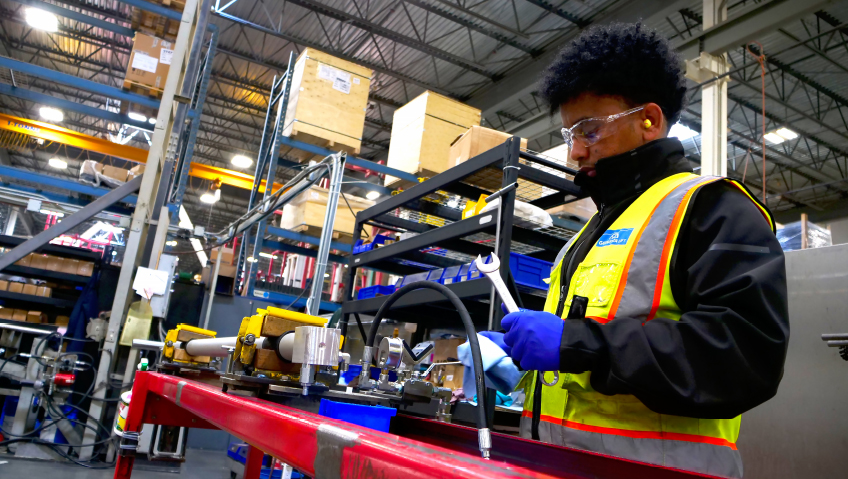Building strong connections with clients by understanding the various responsibilities and difficulties that every developer, investor, asset manager, and condo board member encounters has long been Larlyn’s mission as a property management firm. With a remarkable array of certifications, including IREM AMO and ACMO 2000—one of the few real estate management companies in Canada to have attained them all—Larlyn consistently demonstrates its ongoing commitment to customer service while offering technology solutions with exceptional communication and accessibility.
Finding a fresh answer
Embracing the goal of making tough decisions less stressful while welcoming challenges as teaching moments, Larlyn consistently suggests fresh, original, tailored answers for every issue a client faces. From condos, multi-family, and single-family rental properties to luxury high-rises, townhouse complexes, affordable housing, commercial and industrial buildings, historic sites, and unbuilt communities, Larlyn delivers intelligence, exceptional market expertise, and a passion for improving communities, investments, and initiatives.
“We’ve been around a long time, and we’ve been pretty consistent,” says Larry Holmes, President and CEO. What started as “a hobby run amok” with Holmes managing some small properties for a group of investors evolved significantly when those investors encouraged him to make the jump into condominiums. Although initially reluctant, Holmes and his wife Lynne (hence “Larlyn”) eventually agreed, in the process creating value and building relationships—still the backbone of the company to this day. It’s an outlook that has served the company well.
“We’ve grown through referrals, a few acquisitions, and then normal, organic growth,” Holmes explains. “What we’ve had to do—and it’s working very well—is adapt. We’ve had our ups and downs, but we’ve developed a focused team approach.”
Holmes’ business strategy isn’t just one of the property manager looking after a client, he adds. It’s a whole team commitment, with the property manager also acting as the account manager, backed by a regional manager. Each account has a dedicated accounting person, and each property manager has an administrator who works with them on their portfolio, providing a backup, or buddy system, that keeps everything afloat should someone be sick or on vacation.
Building on education
For instance, Larlyn is currently managing a diverse conglomerate of properties that includes a farm, a plaza, some residential properties, and a marina, and is still expanding in an industry where there’s been an exodus of some of the more senior managers who are either retiring or not wanting to adapt. And while young people come in, they still need to be properly mentored and trained, adds Holmes. There are accredited courses available, but many of the necessary skills can only be acquired via hands-on experience in a variety of situations.
“You have to learn how to deal with people,” he says, which includes negotiating with notoriously challenging condo boards that range from “pretty experienced businesspeople” to those who are not. “You’re forever educating and mentoring boards as well as your staff,” he shares.
Education is key for Holmes, along with systems and processes into which he has invested greatly, including weekly meetings for the company’s three geographic regions of Alberta, the GTA (Greater Toronto Area), and southwestern Ontario. Each is headed up by a regional director who meets with their entire staff once a week to review what has happened the previous week and plan for the week ahead.
“We also try to have one educational program every month, whether internally or externally,” Holmes says. “We’ve been quite active in that regard recently because we have quite a few newer staff doing a great job, but the more we can help them, the better. It’s continuous team building and educating.” Senior staff supported in obtaining their MBA, or bookkeepers continuing to their CGA or CMA qualifications, for instance, is quite common at Larlyn because it’s all in the name of building a stronger team.
The company is also practised at adapting to a variety of challenges, including those that COVID threw its way, managing to pivot quickly via “extremely good computer software and systems” that allowed employees to work remotely, which partly continues today via a hybrid scenario that has reduced the number of physical branches. “Accountants who want to continue working from home still can,” says Holmes. “The new ones, we bring into the office because of the social and educational aspect,” while property managers work successfully in hybrid positions for the most part. But Holmes continues to stress the social importance of hands-on experience.
Success in relationships
“We’ll continue what we’re doing,” he says, “with a strong emphasis on relationships. I can teach almost anybody to manage a building, but it’s really tough to teach people how to deal with people. Relationships are huge, and we promote that as much as anything, and we’ll continue our emphasis on building relationships.”
In short, it’s not about what he wants, but what the customer wants, a commitment that has set the tone for Larlyn’s ongoing success and impressive history. “We consciously look at where we’re at and evaluate our systems,” Holmes says, “and where something isn’t working the way it’s supposed to, we try to fix it. We’re not perfect, but by addressing issues and developing people and keeping the focus on customer service and relationships, I think we will continue to be successful.”
That impressive history is also a result of embracing the team approach, he adds, along with a focus on building relationships and striving to always “hire good people.” Adopting smart and effective systems and processes as you grow is also vital, he adds.
“We went through a period where we were buying extra systems to attach to the existing system to try to make things better, and I eventually said, ‘let’s stop that and use the system we have,’” which, he says, is one of the best in North America, if not the world. “‘Let’s just figure out how to use it and use it well,’ and that’s what we’ve been doing. It’s made it easier for everybody, and certainly has had a good impact.”
It’s surprising, he adds, that many boards don’t know how to read their financial statements, which is a setback within the industry. While government licensing has some good points, it also has some challenges, which Holmes hopes will be ironed out over the next five to 10 years. “We used to be able to train in-house for the licensing ability, and our people, when we trained in-house, got better marks than when they go to the colleges,” he says. “The exams were still proctored, so it was the same material, but our people got higher marks and a better understanding of the various topics.”
Why was that? Holmes says that students in a classroom with people from other companies are often uncomfortable opening up about issues that might be happening within their own company. “They don’t want to look stupid, and they don’t want to share information about their company,” he says. Conversely, if they’re in a group made up entirely from one company, attending a course given by someone from the same company, their discussion will be about real-case scenarios which not only provide a better education but could make a real impact within the industry. Online courses don’t offer this true opportunity for learning and learning well.
“There’s nothing like case studies and discussions on cases to help you understand different situations that can occur,” he says. “But that’s one area that I hope they look at changing. They don’t seem to be talking about it yet, but that would improve the overall quality of people graduating and getting their licenses.”
Looking for the difference
Along with better, more useful education and hands-on experience, what else makes a difference in a successful property management company? Holmes has a few more solid suggestions.
“You have to learn to address issues. It’s not a weakness to admit you don’t understand something or you’ve made a mistake; it’s a weakness when you don’t,” he says. “If you can’t admit it, you can’t fix it.”
He has been able to grow Larlyn so well over the years precisely because he was determined to pivot and change with the times, making progress not only within his own company but also within the industry. “We try to keep an open mind,” he adds. “Nothing can be static in today’s world. You have to learn to adapt around it, to keep yourself competitive and keep your people on top of things.”






